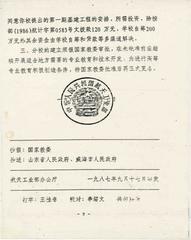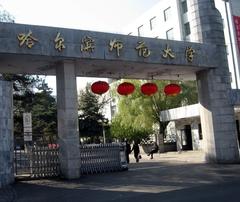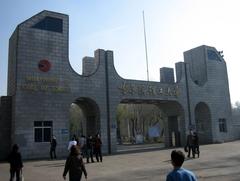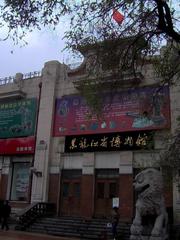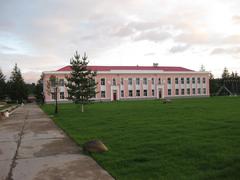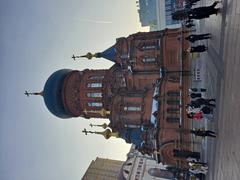Harbin Engineering University Visiting Hours, Tickets, and Historical Sites Guide
Date: 14/06/2025
Introduction
Harbin Engineering University (HEU), situated in the bustling city of Harbin, China, is a prestigious institution celebrated for its engineering and technological innovation. Since its establishment in 1953 as the PLA Military Engineering Institute, HEU has transformed from a defense-focused academy into a comprehensive, multidisciplinary research university. Today, it stands at the forefront of marine engineering, nuclear science, and advanced technology. This guide provides prospective visitors, students, and academic enthusiasts with a detailed overview of HEU’s history, campus highlights, visiting hours, ticketing, accessibility, travel tips, and nearby attractions, ensuring an informed and enriching visit (Times Higher Education; China Schooling).
Table of Contents
- Introduction
- Historical Overview
- Academic and Research Achievements
- Internationalization and Global Standing
- Campus and Cultural Legacy
- Milestones and Notable Contributions
- Visiting Harbin Engineering University
- Nearby Attractions in Harbin
- Tips for Visitors
- Frequently Asked Questions (FAQ)
- Accommodation, Dining, and Other Services
- Plan Your Visit
- Conclusion
- References
Historical Overview
Founding and Early Development
HEU was founded in 1953 as the PLA Military Engineering Institute, aligning with the early ambitions of the People’s Republic of China to achieve technological self-reliance and support its defense sector. The initial academic framework and faculty were heavily influenced by Soviet standards, reflecting the close ties between China and the USSR at the time. The university quickly established itself as a hub for military and engineering research, especially in shipbuilding and marine engineering (Times Higher Education; China Schooling).
Transformation and Renaming
The 1960s saw HEU shift towards a broader academic mission. In 1970, it became the Harbin Shipbuilding Engineering Institute, opening its doors to civilian engineering disciplines. This transformation continued in 1994 when the university adopted its current name, Harbin Engineering University, reflecting its evolution into a multidisciplinary, research-intensive institution (Times Higher Education; China Schooling).
National Recognition and Strategic Projects
HEU’s growth paralleled China’s major higher education initiatives. It was among the first to be included in “Project 211” and later in the “985 Project” Specific Disciplines Innovation Platform. These designations attracted significant government investment, enabling the university to expand its research infrastructure and academic offerings (China Schooling; HEU Admission Guide PDF).
Academic and Research Achievements
HEU has contributed significantly to China’s technological advancement. Notable achievements include the development of China’s first experimental submarine, hydrofoils, carrier-based computers, duplex submarines, hovercraft, and gradient sound velocity profilers. The university now comprises 23 colleges, departments, and centers; 13 postdoctoral research stations; and 56 undergraduate programs. Its faculty includes 8 academicians, over 700 professors and associate professors, and a student body of approximately 27,000 (Times Higher Education; China Schooling).
Internationalization and Global Standing
HEU has strongly embraced internationalization, actively recruiting overseas students and collaborating globally. As a participant in the Chinese Government Scholarship (CSC) program, it offers fully funded scholarships to international undergraduate, master’s, and Ph.D. students (Chinese Scholarship Council). HEU is ranked #851 in the 2025 Best Global Universities ranking, and its computer science discipline is recognized among the world’s top 1% (HEU College of Computer Science).
Campus and Cultural Legacy
Located in Harbin’s Nangang District, HEU’s campus reflects the city’s distinctive blend of Chinese and Russian influences. The motto, “Great Engineering Towards Perfection, Great Learning Towards Veritas,” captures its commitment to excellence. The university fosters a vibrant academic and cultural environment, hosting numerous scientific, technological, and cultural events (HEU Admission Guide PDF).
Milestones and Notable Contributions
- 1953: Founded as PLA Military Engineering Institute.
- 1970: Became Harbin Shipbuilding Engineering Institute.
- 1994: Renamed Harbin Engineering University.
- 1990s–2000s: Selected for “Project 211” and “985 Project.”
- 2001: College of Computer Science and Technology established (HEU College of Computer Science).
- Present: Globally recognized for marine engineering, nuclear science, and international academic programs.
Visiting Harbin Engineering University
Visiting Hours and Access
- Visiting Hours: 8:00 AM to 6:00 PM, Monday to Friday. Some facilities may have specific hours or require appointments.
- Registration: Visitors should register at the main gate or the International Exchange Center. For academic or group tours, contact the university in advance via the official HEU website.
Tickets and Entry
- Campus Entry: Free for general access.
- Special Facilities: Access to laboratories, museums, or research centers may require prior arrangement or guided tours.
Guided Tours and Special Events
- Guided Tours: Available by appointment through the International Office or International Exchange Center. These tours highlight laboratories, museums, and historic monuments.
- Special Events: HEU hosts academic conferences, cultural festivals, and exhibitions, especially during the Ice and Snow Festival and university anniversaries.
Campus Highlights
- Engineering Museum: Exhibits pioneering maritime and naval technology.
- Memorial Halls: Document the university’s military engineering origins.
- Confucius Institute: Promotes Chinese language and culture.
- History Museum: Chronicles HEU’s development with archives, models, and multimedia displays.
- Student Activity Center: Hosts cultural performances and student exhibitions.
Accessibility and Transportation
- By Air: Harbin Taiping International Airport (40 km). Taxis (120–150 RMB), shuttle buses, and ride-hailing services available (Harbin Fact Sheet).
- By Train: Harbin Railway Station (7 km from campus), Harbin East, and Harbin West. Metro Line 1 stops at “Gongcheng Daxue” (Engineering University) (Harbin Metro Guide).
- By Bus: Routes 15, 26, and 78 serve the campus.
- On Campus: Accessible paths, English signage, and rental bicycles/electric scooters available. Winter visitors should use caution due to icy surfaces.
Nearby Attractions in Harbin
- Harbin Ice and Snow World: Renowned ice sculpture festival (December–February).
- Saint Sophia Cathedral: Russian Orthodox church and architectural landmark.
- Zhongyang Street: Historic pedestrian street with shops and cafes.
- Sun Island: Scenic park on the Songhua River (Harbin Attractions).
Tips for Visitors
- Best Times to Visit: Spring and autumn for mild weather; winter for the Ice and Snow Festival.
- Clothing: Dress warmly in winter (temperatures can drop below -20°C); summers are mild (Harbin Travel Tips).
- Language: Mandarin is predominant; English is spoken in international departments. Translation apps are helpful.
- Currency: Chinese Yuan (RMB). Alipay and WeChat Pay are widely accepted; international credit cards are less commonly used.
- Internet: Free Wi-Fi in public areas; VPN may be needed for some global sites.
- Safety: HEU is a secure campus with 24-hour security. Carry ID and follow campus rules.
- Photography: Permitted in public areas; request permission for research facilities.
Accommodation, Dining, and Other Services
- On-Campus Accommodation: International Exchange Center offers hotel-style rooms and apartments (20 RMB/day+ for students; advance booking recommended) (HEU Accommodation).
- Nearby Hotels: Range from budget to international chains (200–800 RMB/night).
- Dining: Campus cafeterias serve Chinese and international cuisine. Nearby streets offer local specialties, Russian bakeries, and halal food.
- Medical Services: On-campus clinic for basic care; nearby hospitals for emergencies.
- Additional Services: Conference rooms, translation, and car rental available through the International Exchange Center.
Frequently Asked Questions (FAQ)
Q: What are the visiting hours for HEU?
A: 8:00 AM to 6:00 PM daily; specific facilities may have different schedules.
Q: Is there a campus entry fee?
A: No, campus entry is free. Some tours or exhibitions may require tickets.
Q: Can I arrange a guided tour?
A: Yes, by contacting the International Office or International Exchange Center in advance.
Q: Are there English-speaking staff on campus?
A: Yes, primarily in international and administrative departments.
Q: What payment methods are accepted on campus?
A: Cash, Alipay, and WeChat Pay.
Q: How do I register as a visitor?
A: At the main gate or International Exchange Center upon arrival.
Q: Is the campus accessible for those with mobility challenges?
A: Most public areas and paths are accessible; caution is advised in winter.
Plan Your Visit
To maximize your experience, review current visiting hours, make necessary bookings, and check event schedules via the HEU official English website. For campus maps, travel updates, and special event information, also visit the ApplyforChina university profile.
Download the Audiala app for personalized travel guides, navigation tips, and exclusive content. Follow HEU’s news portal and our social media channels for real-time updates and event announcements.
Summary
Harbin Engineering University exemplifies China’s transformation in higher education, evolving from a military institute into a globally recognized university. Its campus offers a unique blend of academic excellence, technological innovation, and cultural vibrancy, making it a compelling destination for both academic visitors and cultural travelers. With accessible facilities, diverse events, and proximity to Harbin’s top attractions, HEU provides a rich, immersive experience for all visitors (Times Higher Education; China Schooling).
References
- Harbin Engineering University World Rankings, 2025, Times Higher Education (https://www.timeshighereducation.com/cn/world-university-rankings/harbin-engineering-university)
- Harbin Engineering University Profile, China Schooling (https://chinaschooling.com/universities/harbin-engineering-university/)
- HEU Admission Guide, 2025 (https://heucice.hrbeu.edu.cn/__local/6/CF/D1/2997B0F87FA7C5A9CAA299F3511_6CF6A6CE_33DC6.pdf)
- Harbin Engineering University International Programs, Chinese Scholarship Council (https://www.chinesescholarshipcouncil.com/harbin-engineering-university.html)
- HEU College of Computer Science Overview, 2025 (https://computer.hrbeu.edu.cn/About_Us1/Overview.htm)
- Official HEU English Website, Visitor Information (https://english.hrbeu.edu.cn/)
- Harbin Fact Sheet (https://www.icefestivalharbin.com/article-p18-harbin-fact-sheet.html)
- Harbin Metro Guide (https://www.eastchinatrip.com/harbin-metro-map-guide/)
- HEU Accommodation (https://english.hrbeu.edu.cn/Campus/Life_at_HEU/Accommodation.htm)
- HEU in Autumn (https://heu.cucas.cn/)
- Harbin Travel Tips (https://www.easytourchina.com/tip-v294-harbin-travel-tips)
- Harbin Attractions (https://www.harbinice.com/fact-v7-history-facts-of-harbin.html)
- ApplyforChina university profile (https://applyforchina.com/universities/harbin-engineering-university/)
